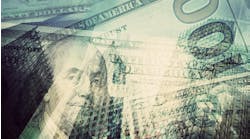If you rely on the mainstream news media to help you assess the U.S. economy's health, Alan Beaulieu wants to bring you out of your depression. As president of ITR Economics, which regularly analyzes the GDP health of developed and developing countries, he suggests you put your crying towel away and buy yourself something. And if you have to borrow money, do it—as long as your company's fiscally healthy.
This is the message he left with attendees at a strategy session conference held yesterday, sponsored by Industry Week magazine and the Italian Trade Commission, and held at The Inn at St. John's, near Detroit.
“The ability to borrow is a competitive advantage,” he said. “Invest in yourselves while competitors can't keep up. That's the new way to compete. Borrow enough until you can't sleep at night.”
Of course that last remark was tongue in cheek, but he was dead serious that the recession everyone just got through left them a gift in disguise: positive cash flow at low interest rates. He's confident that the global economy for the next six years will be busy.
“This is a vibrant recovery for manufacturing, and there are solid economic reasons,” he said. “Bank liquidity is a big one. Banks have $1.5 trillion in excess capital reserves. That's larger than the GDP of Canada. Businesses have over $2trillion in cash. That's lots of economic potential. Right now consumers are spending, banks are lending and government is providing stimulus.”
Beaulieu expects interest rates to remain stimulative through 2013, after which the cost of borrowing will rise. So in the next year, he suggests you load up on the debt for expansion sake, buy new equipment, find the right employees, and finance it all at the lowest interest rates you'll see for the next 20 years.
What about Europe? Beaulieu says it will not fall apart, as some media outlets may lead you to believe. The northern nations like Germany are flush with cash and have money to bail out the southern states. They're not happy about the prospect of doing that, but they can't afford to let Italy and Spain go the way of Greece. That would only pull them into the vortex.
Beaulieu noted that the European Commission voted to spend $725 billion in providing a bond fund, which he sees as a dramatic vote of confidence that Italy and Spain won't go the way of Greece.
“The 17-nation Eurozone is 5% of world's GDP,” he said. “The world doesn't want to see the Eurozone fail. The U.S. provided $550 billion early on and five other nations ponied up lots of cash. So there are numerous mechanisms to see it doesn't happen.”
As a result, Europe will be more vibrant for the next 10 to 20 years.
But what if something bad does happen in Europe?
Beaulieu says it still won't drag the U.S. economy down with it. He points to Federal stress tests that have shown that 15 out of the 19 largest financial units in the U.S. can withstand a 30% unemployment rate and a 50% drop in the Dow. That means we can take a massive overseas hit and still remain standing without needing a federal bailout.
And although China is slowing down they're looking at stimulus spending again. In fact they're spending on projects they don't need, but that will create jobs and carry their economy forward. China won't be as strong as it was three years ago but their slowdown won't cause global recession—for at least 20 years.
There—he said it again. The next 20 years will be a time of great prosperity. That leads to the ultimate question: Then what?
He expects that in 20 years the bubble will burst and there will be an economic correction and a global economic problem. If you're still around in 20 years your world doesn't have to end at that point. Beaulieu suggests you put down the newspaper and stay on top of the leading economic indicators like his company's Trendcast and the Institute for Supply Management's Purchasing Managers Index. Doing this will let you look forward with courage, he concluded.
But wait--what about this year's election? Won't the result have a big impact on what happens economically? Beaulieu believes no matter who's elected, the Bush tax cuts will be renewed. Other than that, the presidential election will have no impact on the economy for the near term.
So enjoy the next 20 years. Start now. Buy yourself a couple forklifts.
Related Editorial:
Mild but Manageable Recession in 2013?


